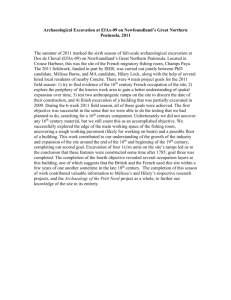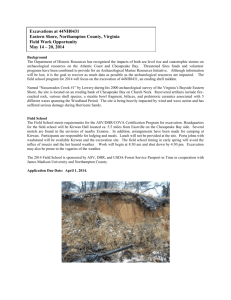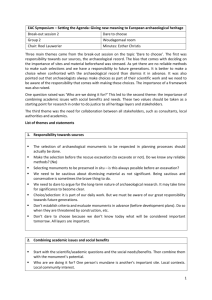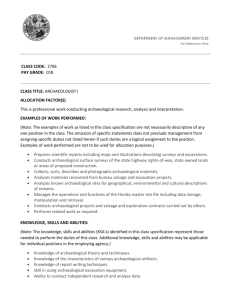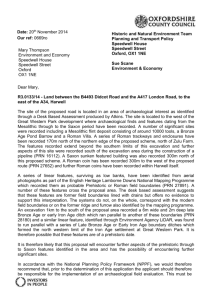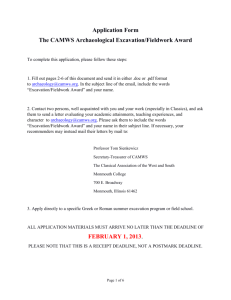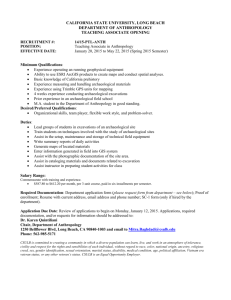Module specification template
advertisement
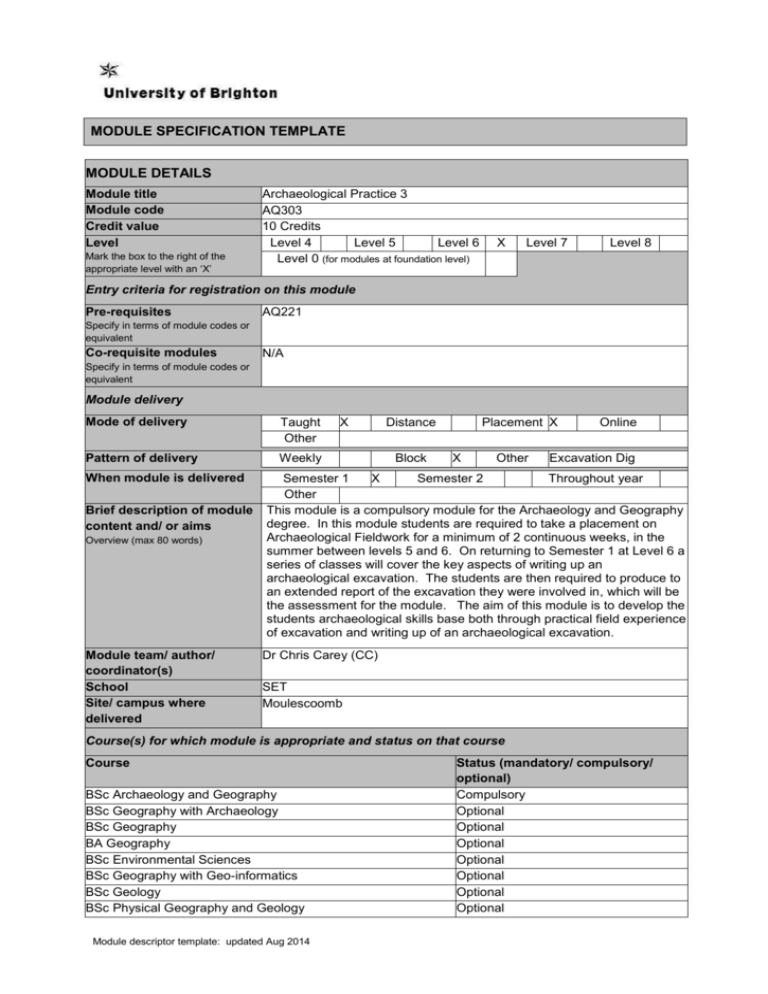
MODULE SPECIFICATION TEMPLATE MODULE DETAILS Module title Module code Credit value Level Mark the box to the right of the appropriate level with an ‘X’ Archaeological Practice 3 AQ303 10 Credits Level 4 Level 5 Level 6 Level 0 (for modules at foundation level) X Level 7 Level 8 Entry criteria for registration on this module Pre-requisites AQ221 Specify in terms of module codes or equivalent Co-requisite modules N/A Specify in terms of module codes or equivalent Module delivery Mode of delivery Taught Other Pattern of delivery Weekly When module is delivered Brief description of module content and/ or aims Overview (max 80 words) Module team/ author/ coordinator(s) School Site/ campus where delivered X Distance Block Placement X X Other Online Excavation Dig Semester 1 X Semester 2 Throughout year Other This module is a compulsory module for the Archaeology and Geography degree. In this module students are required to take a placement on Archaeological Fieldwork for a minimum of 2 continuous weeks, in the summer between levels 5 and 6. On returning to Semester 1 at Level 6 a series of classes will cover the key aspects of writing up an archaeological excavation. The students are then required to produce to an extended report of the excavation they were involved in, which will be the assessment for the module. The aim of this module is to develop the students archaeological skills base both through practical field experience of excavation and writing up of an archaeological excavation. Dr Chris Carey (CC) SET Moulescoomb Course(s) for which module is appropriate and status on that course Course BSc Archaeology and Geography BSc Geography with Archaeology BSc Geography BA Geography BSc Environmental Sciences BSc Geography with Geo-informatics BSc Geology BSc Physical Geography and Geology Module descriptor template: updated Aug 2014 Status (mandatory/ compulsory/ optional) Compulsory Optional Optional Optional Optional Optional Optional Optional BSc Earth and Ocean Science BSc Environmental Hazards Optional Optional MODULE AIMS, ASSESSMENT AND SUPPORT Aims The aim of this module is to develop the students archaeological skills through both practical field excavation and the writing up of an archaeological excavation. The writing up of the excavation will be an extended archaeological report developing skills in post excavation analysis and presentation. Learning outcomes Having successfully completed the module, students will be able to: 1. Independently undertake practical field excavation and survey. 2. Construct a stratigraphic analysis of archaeological excavation data and understand the limitations of the data. 3. Undertake archaeological analysis and presentation through writing a report and preparing a presentation on their excavation. 4. Critically assess how an archaeological narrative is constructed from field excavation data. Content The students are required to undertake a block of archaeological fieldwork between levels 5 and 6 in the summer. This fieldwork will normally consist of archaeological excavation for a minimum of two weeks. The location and period of the archaeological excavation is the students choice. Throughout the archaeological fieldwork students will need to keep a journal, take photographs, etc of the fieldwork. On return to the University at Level 6 the students will be required to write an archaeological report on the excavation including drawing up sections and plans, using archaeological photographs and undertaking a stratigraphic analysis of the data. This data has then to be interpreted to produce an archaeological narrative. Students are required to produce an extended report detailing the results and interpretation of their excavation. Learning support Recommended books for the course Indicative archaeological text books: Andrews, C. 1991. Management of Archaeological Projects (MAP2). English Heritage. Collis, J. 2004. Digging up the Past. Sutton. Cronyn, J. 1995. The Elements of Archaeological Conservation. Routledge London. Drewett, P. 2011. Field Archaeology: An Introduction. Routledge. Evans, J.G. & O’Connor, T. 1999. Environmental Archaeology: Principles and Methods. Sutton. Renfrew, C. and Bahn, P. 2012. Archaeology: Theories, Methods and Practice. 5th edition. Thames & Hudson. Shanks, M and Tilley, C. 1992. Re-constructing archaeology Theory and Practice 2nd Edition. Routledge London. Indicative sources of archaeological excavation: Within department (CC/JC) Council for British Archaeology Sussex Archaeological Society Module descriptor template: updated Aug 2014 The Prehistoric Society Teaching and learning activities Details of teaching and learning activities This module is mainly field based excavation with some guided study when the students return to University to enable them to fulfil the production of their extended reports. Allocation of study hours (indicative) Study hours Where 10 credits = 100 learning hours SCHEDULED 2 x 2 hour classes – support for writing up the archaeological excavation 4 hours GUIDED INDEPENDENT STUDY Independent working/reading 26 hours PLACEMENT 2 weeks continuous fieldwork (10 days, 7 hours per day) 70 hours TOTAL STUDY HOURS 100 Assessment tasks Details of assessment on this module This module has a single assessment with an extended report on the archaeological fieldwork undertaken. Coursework I: LO1, LO2, LO3, LO4 Types of assessment task1 % weighting Indicative list of summative assessment tasks which lead to the award of credit or which are required for progression. (or indicate if component is pass/fail) WRITTEN COURSEWORK An extended report (3000 words) describing and interpreting the archaeological fieldwork 100% PRACTICAL EXAMINATION INFORMATION Area examination board Geography and Geology Refer to University for guidance in completing the following sections External examiners Name Position and institution Date appointed Date tenure ends Naomi Holmes Senior Lecturer University of Northampton 01/09/2014 01/09/2018 1 Set exercises, which assess the application of knowledge or analytical, problem-solving or evaluative skills, are included under the type of assessment most appropriate to the particular task. Module descriptor template: updated Aug 2014 QUALITY ASSURANCE Date of first approval April 2015 Only complete where this is not the first version Date of last revision Only complete where this is not the first version Date of approval for this version April 2015 Version number 1 Modules replaced Specify codes of modules for which this is a replacement Available as free-standing module? Module descriptor template: updated Aug 2014 Yes X No

